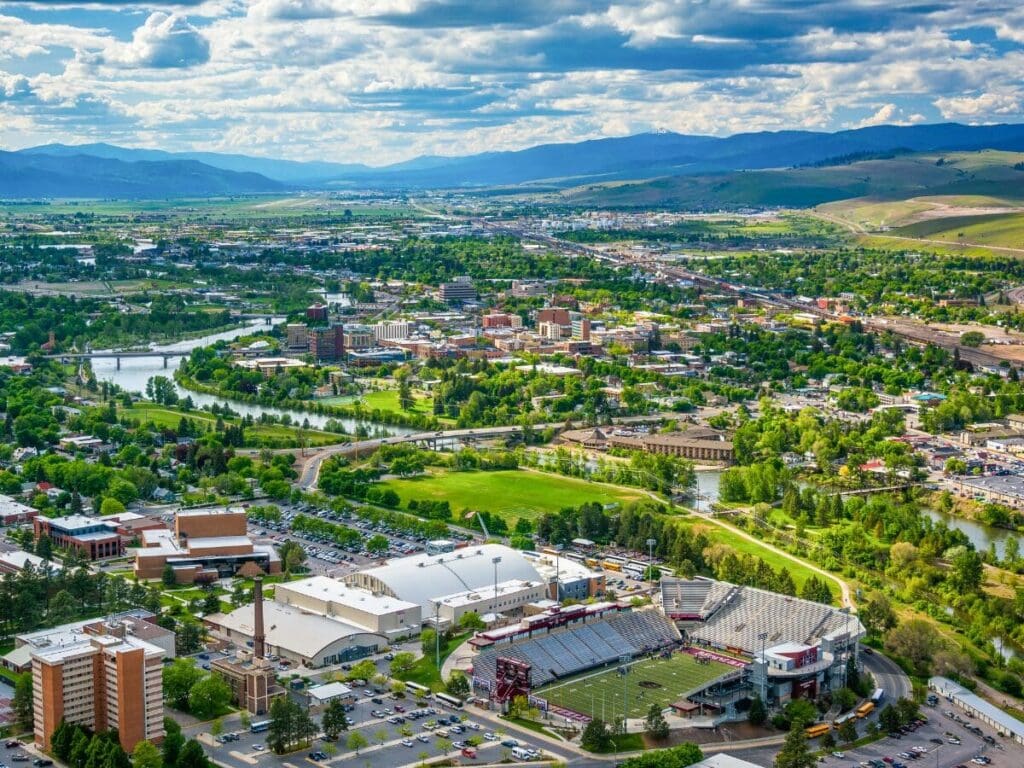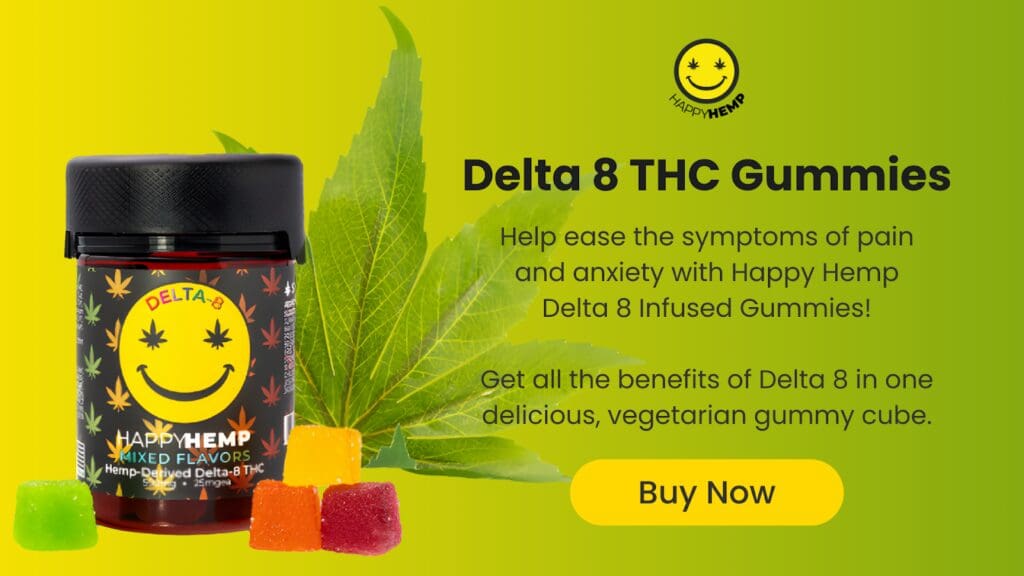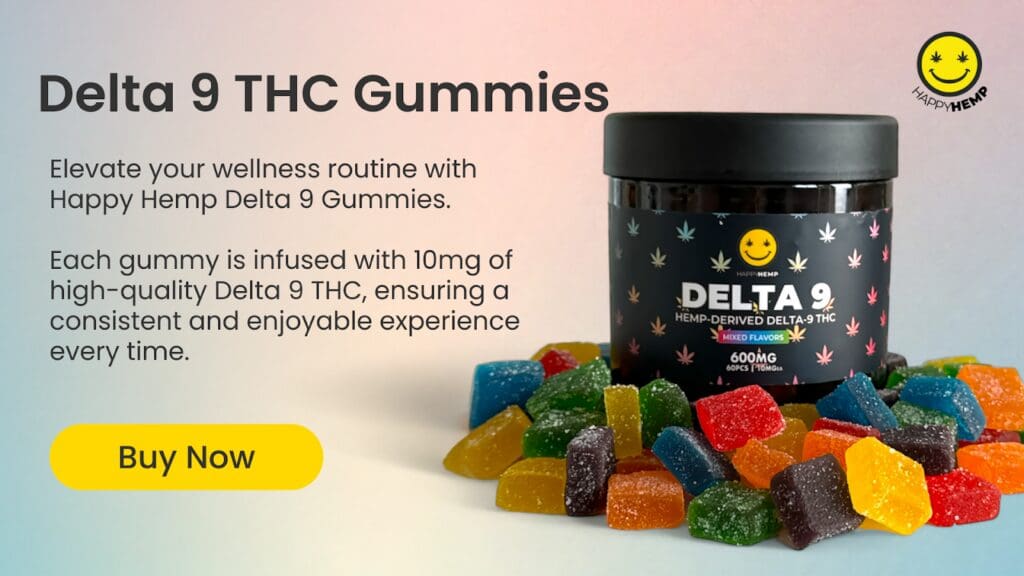Key Takeaways:
- Delta 8 is Illegal in Montana: Montana prohibits the sale, purchase, and possession of Delta 8 THC, aligning it with other controlled substances.
- Legal Cannabis Alternatives are Available: Montana residents can legally access Delta 9 THC products through licensed dispensaries and CBD products derived from hemp.
- Future Legal Changes Are Possible: The legal status of Delta 8 in Montana could evolve with federal guidelines, scientific research, and public demand.
Delta 8 THC has gained popularity across the United States, sparking curiosity and questions about its legality, safety, and effects. This cannabinoid, often compared to the more widely known Delta 9 THC, offers similar benefits but with a unique twist in terms of effects and legality. However, as with many cannabis-related products, Delta 8’s legal status varies from state to state, making it essential to understand local laws before purchasing or using it.
At Happy Hemp, we pride ourselves on being a trusted source for high-quality Delta 8 THC products. With years of expertise in the hemp industry, we’re committed not only to providing premium products but also to educating our customers about the developments in cannabis and hemp laws, especially in states where legal clarity is critical.
In this article, we’ll discuss what Delta 8 THC is, explore how it differs from other cannabinoids like Delta 9, and discuss the laws surrounding Delta 8 THC in Montana. By the end, you’ll have a clear understanding of whether Delta 8 is legal in Montana and what you need to consider if you’re interested in trying it.
How Does Delta 8 Differ From Delta 9 THC?
Although Delta 8 and Delta 9 THC are chemically similar, they have several key differences that impact their effects, legality, and usage. Here’s a breakdown of how these two cannabinoids differ:
- Chemical Structure: Both Delta 8 and Delta 9 THC share a similar molecular structure, but there is a slight difference in the placement of a double bond. This subtle variation affects how each cannabinoid interacts with receptors in the body, resulting in different effects.
- Psychoactive Effects: Delta 8 THC is known for producing a milder “high” compared to Delta 9. Users often report feeling more relaxed and clear-headed with Delta 8, experiencing less anxiety or paranoia, which can sometimes be associated with Delta 9 THC.
- Potency: Delta 8 is generally considered to be less potent than Delta 9 THC. This makes it a popular choice for individuals looking for the benefits of THC without the intensity of a traditional high.
- Source and Production: Delta 9 THC is found abundantly in marijuana, whereas Delta 8 is present in only trace amounts in both marijuana and hemp. To obtain usable quantities, Delta 8 is typically synthesized from CBD derived from hemp plants.
- Legality: The legal status of Delta 8 and Delta 9 differs at both the federal and state levels. Delta 9 THC is generally illegal in states without medical or recreational marijuana laws, while Delta 8 falls into a legal gray area that varies significantly from one state to another.
Understanding the distinctions between Delta 8 and Delta 9 THC can help you choose the right product based on your desired effects and tolerance level. For a smoother, enjoyable Delta 8 experience, try Happy Hemp’s Delta 8 Gummies, crafted to provide all the relaxing benefits without overwhelming effects. Explore our Delta 8 Gummies here and discover a balanced way to enjoy Delta 8 today!
Federal Laws On Delta 8 THC
Under the 2018 Farm Bill, hemp and its derivatives were legalized across the United States. Hemp is defined as cannabis containing less than 0.3% Delta 9 THC by dry weight, allowing cannabinoids derived from hemp, including CBD, to be legally produced and sold. Since Delta 8 can be derived from hemp CBD, many interpret this as making Delta 8 federally legal.
However, the U.S. Drug Enforcement Administration (DEA) has taken steps to clarify the status of Delta 8. In 2020, the DEA released an Interim Final Rule stating that all synthetically derived tetrahydrocannabinols (THCs) remain Schedule I controlled substances, which are illegal under federal law. Because Delta 8 THC is often produced synthetically by converting CBD into Delta 8, its legality remains in a gray area, with some legal experts suggesting that Delta 8 might fall under the “synthetically derived” classification.
As a result, states have been left to determine their own policies on Delta 8 THC, leading to a patchwork of regulations nationwide. In some states, Delta 8 is banned or restricted, while others allow its sale freely.
Is Delta 8 Legal In Montana?
As of the most recent updates, Delta 8 THC is not legal in Montana. Montana has specific regulations that restrict the sale, possession, and use of Delta 8 THC. Although recreational cannabis and some THC products are now permitted under state law, Delta 8 THC remains an exception. The state government has raised concerns over the lack of regulation and potential health risks associated with Delta 8, prompting its prohibition within Montana’s borders.
Montana State Laws On Delta 8 THC
Montana has taken a clear stance on Delta 8 THC, categorizing it as a controlled substance and imposing restrictions similar to those on Delta 9 THC. Here are the key points regarding Montana’s approach to Delta 8:
Controlled Substance Classification
In Montana, Delta 8 THC is classified as a controlled substance, placing it alongside other restricted drugs. This classification means that possessing, producing, or selling Delta 8 products is prohibited statewide. Montana’s controlled substance laws prioritize public health and safety, making it clear that any psychoactive cannabinoids without specific state authorization are not allowed.
Hemp-Derived Products
While the 2018 Farm Bill federally legalized hemp-derived products, Montana enforces its own state laws for cannabinoids like Delta 8. Although CBD derived from hemp is legally allowed, Delta 8’s psychoactive nature and synthetic production processes fall outside Montana’s permissible hemp product categories. This approach underscores the state’s preference for non-psychoactive hemp products, keeping Delta 8 strictly off-limits.
Recreational And Medical Cannabis Distinction
Montana’s recreational and medical cannabis laws allow adult-use marijuana and certain THC products through licensed dispensaries. However, this does not extend to Delta 8 THC, as it is not classified under the same cannabis regulations as traditional marijuana. Montana’s marijuana laws are specifically designed for natural cannabis products, while synthetic cannabinoids like Delta 8 are treated separately and remain illegal.
Safety And Regulatory Concerns
Montana has expressed concerns over the safety and regulation of Delta 8 THC, as it is often synthesized from CBD in a lab rather than naturally occurring in high concentrations in cannabis. The chemical processes involved in producing Delta 8 are largely unregulated, raising issues about product purity, dosage, and consumer safety. By prohibiting Delta 8, Montana aims to prevent unregulated products from reaching the public until clearer safety standards and guidelines are established.
Legal Alternatives To Delta 8 THC In Montana
Since Delta 8 THC is prohibited in Montana, residents seeking similar effects have several legal alternatives available. These options include various cannabinoids and hemp-derived products that comply with state regulations. Here are some popular legal alternatives:
Full-Spectrum CBD
For those looking for a more robust experience, full-spectrum CBD includes a range of cannabinoids naturally found in the hemp plant, including trace amounts of Delta 9 THC (below the federal limit of 0.3%). This type of product leverages the “entourage effect,” where cannabinoids work together to enhance overall effects. While still non-psychoactive, full-spectrum CBD may feel slightly more potent than pure CBD.
CBG (Cannabigerol)
CBG, another cannabinoid found in hemp, has recently gained attention for its therapeutic properties. Often referred to as the “mother cannabinoid,” CBG is a precursor to other cannabinoids and offers benefits like anti-inflammatory and pain-relieving effects. Although not psychoactive, it may provide a sense of calm and focus, making it a potential alternative for those seeking mild effects.
Delta 9 THC (In Legal Amounts)
In states where recreational marijuana is legal, such as Montana, Delta 9 THC is an option for adults over the legal age limit. Products containing Delta 9 THC are available through licensed dispensaries, offering a traditional cannabis experience. For those who prefer a regulated and legally compliant option, Delta 9 THC from a licensed source may be a suitable alternative, albeit with a stronger psychoactive effect than Delta 8.
THC-O And Other Minor Cannabinoids
Though Montana restricts Delta 8, other emerging cannabinoids like THC-O might be worth exploring if they comply with state laws. Some of these minor cannabinoids offer unique effects and may be available in compliant forms. However, it’s essential to verify that these products are legally permitted in Montana before purchasing.
Future Of Delta 8 THC Laws In Montana
The future of Delta 8 THC laws in Montana remains uncertain, as state and federal attitudes toward cannabis-derived products continue to change. While Montana currently prohibits Delta 8, future developments in legislation and regulatory oversight could lead to changes. Here are some potential factors that could influence the legal status of Delta 8 in Montana:
Federal Regulatory Changes
Federal regulations play a significant role in shaping how states treat cannabis-derived products like Delta 8 THC. If the federal government, particularly the DEA or FDA, issues clear guidance on Delta 8’s legal status, it could provide a basis for states to adopt consistent policies. These federal actions could either support Delta 8’s regulation for safety and consumer protection or place further restrictions that reinforce its controlled substance status.
State Legislative Action
Montana’s legislature has the power to revisit Delta 8’s status, especially as the market for cannabinoids continues to grow. Lawmakers may consider introducing regulations that permit Delta 8 but require rigorous testing, labeling, and age restrictions to ensure consumer safety. By setting standards for production and sale, Montana could potentially create a regulated market for Delta 8 THC similar to the one established for medical and recreational marijuana.
Public Demand And Industry Growth
The growing popularity of Delta 8 and other alternative cannabinoids has created a consumer demand that many states are struggling to address. If Montana residents show a strong interest in Delta 8 as a legal option, industry advocates may push for policy changes that accommodate consumer preferences. As neighboring states introduce varying laws, pressure from both the public and businesses could encourage Montana to reconsider its current restrictions on Delta 8 THC.
Health And Safety Studies
The ongoing research into Delta 8 THC’s safety and effects will likely play a pivotal role in influencing future regulations. As scientific studies reveal more about its long-term effects and potential health benefits, Montana legislators may feel more confident about allowing it under regulated conditions. If research supports safe, moderate use of Delta 8, the state might introduce legislation to permit it, while ensuring consumer safety through quality standards and product transparency.
Final Thoughts
In Montana, Delta 8 is currently classified as a controlled substance, making it illegal to buy, sell, or possess within the state. While other cannabis products, like Delta 9 THC for recreational and medical use, are legally accessible, Montana has chosen to take a cautious approach to Delta 8 due to safety and regulatory concerns.
For Montana residents and visitors, this means exploring legal alternatives like CBD products or, if interested in THC’s effects, opting for Delta 9 THC products from state-licensed dispensaries. It’s also essential to stay informed, as the laws surrounding Delta 8 could change in response to shifts in public demand, scientific research, and potential federal regulations.
Anyone interested in Delta 8 should carefully follow state laws and remain updated on any future legislative changes. By staying informed, you can make safer and more compliant choices when it comes to cannabis products in Montana.
Read also:
- Delta 8 For Better Sleep – Discover The Benefits For A Restful Night
- How Long Does Delta 8 Stay In Your Body?
- Things You Should Know About Delta-8
Frequently Asked Questions About Delta 8 Legality In Montana
Is it legal to buy Delta 8 THC in Montana from other states?
No, Montana law prohibits Delta 8 THC, so bringing it from other states is also illegal.
Does Montana allow Delta 8 THC for medical use?
No, Delta 8 THC is not permitted for medical use in Montana; only specific Delta 9 THC products are allowed under medical marijuana laws.
Why is Delta 8 THC illegal in Montana while Delta 9 is legal for recreational use?
Montana restricts Delta 8 THC due to concerns over unregulated production methods and synthetic derivation, while Delta 9 THC is regulated through licensed dispensaries.
Is Delta 10 THC also illegal in Montana?
Yes, similar to Delta 8 THC, Delta 10 THC is illegal in Montana because it falls under the same regulatory approach as other synthetic cannabinoids.
Can Montana residents order Delta 8 THC online?
No, most reputable online vendors won’t ship Delta 8 THC to Montana due to its illegal status in the state.
Are there any proposed bills to legalize Delta 8 THC in Montana?
Currently, there are no active bills to legalize Delta 8 THC in Montana, though this could change with future legislative sessions.
Is it possible to get a medical prescription for Delta 8 THC in Montana?
No, Delta 8 THC is not recognized as a medicinal product under Montana’s medical marijuana program.
Sources:
- Agriculture Improvement Act of 2018, H.R. 2, 115th Cong. (2018). https://www.congress.gov/bill/115th-congress/house-bill/2
- Leas, E. C. (2021). The hemp loophole: a need to clarify the legality of delta-8-THC and other hemp-derived tetrahydrocannabinol compounds. American Journal of Public Health, 111(11), 1927-1931.
- Leas, E. C., Nobles, A. L., Shi, Y., & Hendrickson, E. (2022). Public interest in∆ 8-Tetrahydrocannabinol (delta-8-THC) increased in US states that restricted∆ 9-Tetrahydrocannabinol (delta-9-THC) use. International Journal of Drug Policy, 101, 103557.









